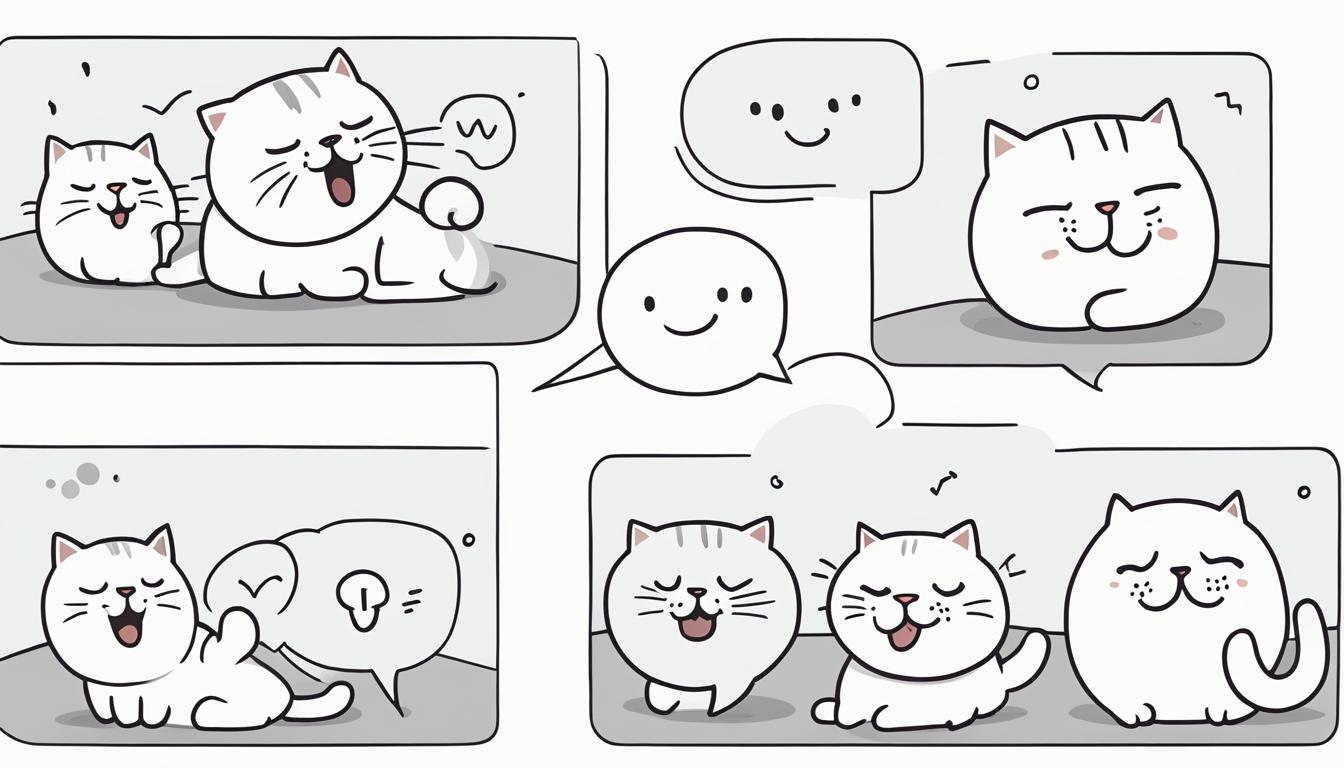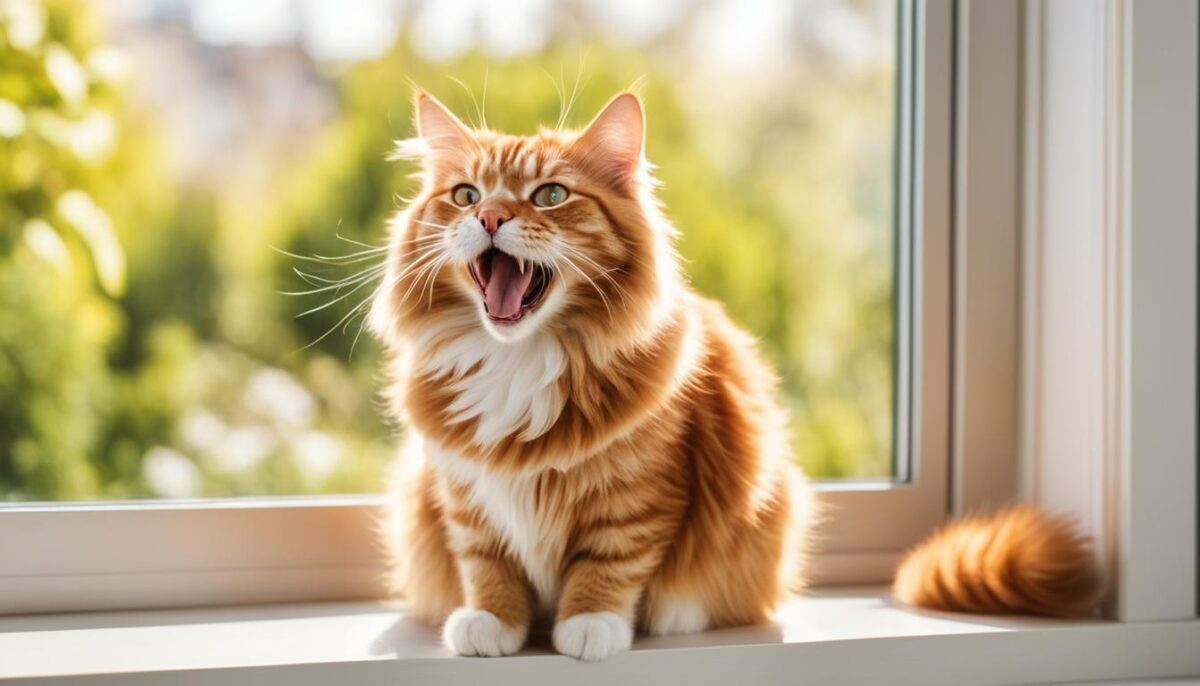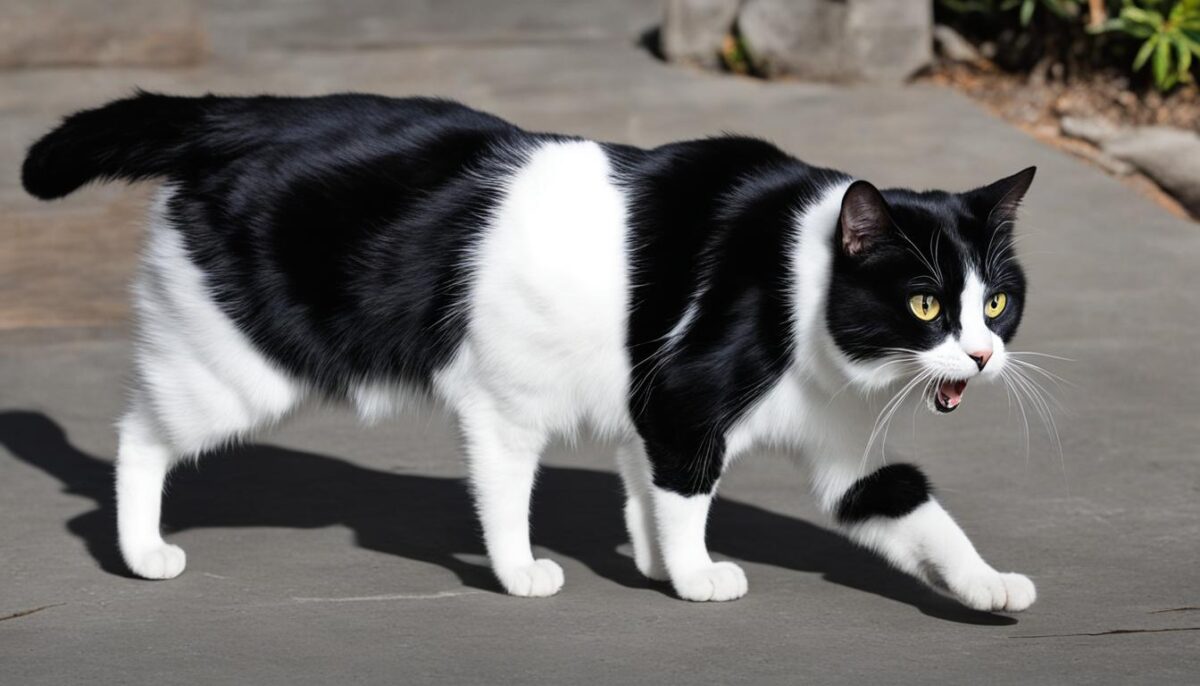Have you ever heard your cat make funny noises and you didn’t know why? Cats talk using cat sounds and feline vocalizations because it is their special way of saying things to us. When cats meow, they could be asking for yummy food or just want some attention from you. Cat communication is not just with meows, though. Cats also chirp and make cute purrs when they’re feeling good!
Sometimes these cat noises can say if your cat is happy, scared, or even mad. If your kitty meows a lot, they might not feel good or could be a bit scared. Did you know cats sometimes purr because they are a little worried? And, when they see birds outside, they might make chirps and chatter because they’re excited. But if you hear a hiss, it’s better to step back because your cat might feel in danger. Listen to the sounds they make, and they will tell you how they feel!
Key Takeaways
- There are many different cat sounds and each one means something special.
- A meow might be your cat asking for food or to say hello to you.
- Purrs can mean your cat feels cozy or a bit worried.
- Chirps are used by cats when they’re excited or want to show you something.
- Remember, if your cat hisses, give them space because they might be scared or upset.
Understanding Cat Communication
Have you ever wondered what your kitty is trying to tell you with all those sounds? Cats have their own special way of talking to us, and each sound they make has a meaning. Let’s learn about the different noises cats make!
The Significance of Meows
Meowing is a key sound in understanding cats. While kittens meow to call for their mom, adult cats meow mostly to chat with their human friends – that’s you! They might meow to say “I’m hungry,” “Pet me,” or “Hey, can I come in?” Listen to how your cat meows; a quick meow might be a hello, but a long one could mean they’re not happy.
Purring: More Than Just Contentment
When your cat is purring, they’re often feeling pretty cozy and relaxed. Think of it as a cat’s way of smiling! But sometimes, if they’re not feeling so sure, they might also purr. Yes, it’s true; if they’re a bit stressed, purring can be their way of trying to calm down.
Chirps and Chirrups: The Feline Attention Grabbers
Ever heard your cat make a chirping or chirruping sound? These feline sounds are super interesting. Mama cats use them to tell their kittens to follow along. When your cat chirps at you, they might be asking you to look at something like a bird outside or telling you they’re super excited!
| Sound | Meaning |
|---|---|
| Meow | “Hello!” or “I want something!” |
| Purr | Happy or sometimes a little worried |
| Chirp/Chirrup | “Look at this!” or “I’m excited!” |
Kitties make all sorts of sounds, and when we start to understand them, we can help make sure they’re happy and feeling good. Whether your cat is meowing, purring, or chirping, they are definitely trying to talk to you. So, next time your furry friend makes a sound, pay close attention – they’re sharing their feelings with you!
The Variety of Noises Cats Produce
Have you ever noticed how your cat makes lots of different sounds? Sometimes they might sound like they’re talking to the birds outside the window, or they might hiss when they’re scared. Let’s dive into what these sounds might mean.
Decoding the Cat Chatter
When cats see something like a bird, they might make a sound called cat chatter. It’s like they’re having a little conversation with themselves because they’re excited. But they might also be a little frustrated because they can’t go outside to play with the bird.
Hissing: A Sign of Distress or Discomfort
Feline hissing is another noise cats make. When they hiss, it’s because they’re not feeling safe. They might be telling a dog or another cat to stay away. A hissing cat might look big and scary, with their back up and teeth showing. It’s their way of saying, “Give me space, please!”
- Happy chatters when seeing birds
- Hisses when feeling threatened
- Purring when comfortable or sometimes nervous
Understanding these cat vocalizations can help you know what your cat is feeling. So next time you hear your cat, watch and listen to help them out!
Why Do Cats Make Hissing and Purring Sounds?
Have you ever seen your cat suddenly make a hissing sound? Or maybe you’ve heard them make a soft purring noise when they are all cozy? These sounds are unique ways cats let us know how they feel.
Cat hissing reasons can be quite simple. If your cat feels scared or sees something new that they don’t trust, they might hiss. Imagine meeting someone new and feeling a bit unsure, just like you might step back, a cat will hiss to say “I need my space!”
Now let’s talk about cat purring explanations. When your cat is super happy and comfortable, perhaps sitting in the sun or in your lap, they’ll purr. But did you know cats also purr when they’re not feeling their best? It’s like when you might hum a song to feel a little better.
- If a big dog is too close, a cat might hiss.
- When you’re giving them a nice pet, they purr.
- A nervous cat might hiss more often than a relaxed one.
Every cat is different, just like people. Some cats hardly ever hiss, while others might be quick to tell us they’re nervous with a hiss. And while many cats purr to show happiness, others purr to calm themselves down. Learning these sounds can help you understand and take care of your furry friend.
Exploring the Wide Range of Feline Vocals
Cats talk in such cool ways, with different sounds for different feelings. If you listen, you can hear their feline vocal range. From a soft meow to a loud yowl or even a scary scream, every sound has its own story. Let’s find out what these cat sounds mean.
From Meow to Yowl: What Your Cat’s Vocalizations Mean
When your cat meows, they might want something like snacks or cuddles. But when the meow turns into a cat yowl, think of it as a meow that’s extra long. Your cat might feel worried, not so great, or be upset because another cat is in their space. If you bring your cat to a new home, they might miss their old spots and yowl. Remember, a quick trip to the vet can help if the yowling is a lot.
When Cats Scream: Mating Calls and Territorial Disputes
Cats sometimes make a cat scream. This happens when boy cats or girl cats are ready to make babies, and they let out really loud yowls. Cats also scream if they’re about to have a fight with another cat over who owns the space. If you hear your cat scream, please check to make sure they’re okay. They might be really scared or even hurt.
| Cat Sound | What It Could Mean |
|---|---|
| Soft Meow | Asking for food or attention |
| Long Yowl | Worried, missing old home, or not feeling well |
| Loud Scream | Mating call or defending their space |
So, if you want to be an expert in understanding cat sounds, keep your ears open and listen to what your cat’s telling you. With a bit of practice, you’ll get the hang of what they’re saying with all their meows, yowls, and screams!
Breed-Specific Tendencies in Cat Communication
When you listen to your pet cat, have you noticed how some cats are much louder than others? This could be because of how different cat breeds act. Yes, each cat is special, but their breeds can tell us a lot about their cat breed behaviors and how often they talk to us.
Talkative Cat Breeds Versus the Quiet Ones
Some cats love to chat! Like the Siamese and Bengal cats, often called vocal cat breeds, they meow a lot because they come from places in Asia where these types of cats happen to be very chatty. It’s like they have a lot to say! On the other hand, quiet cats, such as Persians and Maine Coons, are known for being less noisy. These quiet cats do not meow as much, which might be nicer for people who like a more peaceful home.
Factors Influencing Your Cat’s Vocal Behavior
It’s not just about where they come from; other things can change the way cats talk, too. A kitty that grows up being held and pet a lot might meow more because they’re used to talking with people. And sometimes, older cats might start meowing more because they do not see as well or get mixed up easily. But if you understand these feline communication tendencies, you’ll know why your cat speaks up or stays quiet.
| Breed | Behavior | Talkativeness |
|---|---|---|
| Siamese | Social, expressive | Very talkative |
| Bengal | Curious, engaging | Talkative |
| Persian | Calm, reserved | Quiet |
| Maine Coon | Affectionate, gentle | Less talkative |
Conclusion
As we’ve explored the world of feline vocalizations, it’s clear that your furry friend has much to say. From soft purrs to loud meows, every sound has a purpose. By learning to interpret cat noises, you’re not just hearing, but truly listening to your cat’s unique language. It’s like unlocking a secret code that helps you understand their needs and feelings. Remember, each noise can be a clue about your pet’s well-being.
Watching and listening to your cat can be fun, as each sound adds another piece to the puzzle of their personality. Plus, knowing what different noises mean can help you keep your cat feeling happy and safe. By paying attention, you become a better friend to your cat, and they’ll love you even more for it!
Cats rely on us to keep an eye on their health too. When we hear new or strange sounds, it might be time to ask a vet for help. Cat health communication is key. Being there for your cat, every meow, purr, or hiss along the way, makes sure they are not just heard, but also cared for and loved deeply.
FAQ
What do the different cat sounds like meows and purrs mean?
The sounds your cat makes, such as meows, purrs, chirps, and chatters, are all forms of cat communication. Each sound can indicate a different mood or need. Meows can signal anything from hunger to a desire for attention, while purrs typically indicate contentment but can also signify nervousness or discomfort. Chirps may be used to draw your attention to something, and chatters often occur when a cat is excited but frustrated, such as when watching prey from a window.
Why do cats meow at humans but not at other cats?
Cats use meows primarily to communicate with humans, not with other cats. Kittens meow to their mothers, but as they grow older, they typically reserve meowing for their interactions with people. This could be because humans respond to vocalizations, rewarding the cats with attention, food, or access to different areas.
Can purring mean that a cat is stressed?
Yes, while purring is often associated with a cat feeling happy and relaxed, it can also be a sign that a cat is stressed or unwell. It’s thought that the low frequency of purring may have a calming effect on cats, much like how humans might hum a tune to soothe themselves.
What are chirps and chirrups, and why do cats make these sounds?
Chirps and chirrups are sounds made by cats that generally indicate excitement or to get human attention. Mother cats use these sounds to tell their kittens to follow them, and adult cats may use them to show interest in something or to initiate play or interaction with their human companions.
What does it usually mean when a cat is chattering?
When a cat chatters, usually while looking out the window at birds or squirrels, it’s a sign of predatory excitement and frustration. They may make this sound when they see potential prey but cannot access it, showing their natural hunting instincts.
Why is my cat hissing all of a sudden?
Hissing is a defensive mechanism used by cats when they feel threatened or want to avoid a confrontation. If your cat hisses suddenly, it may have been startled or might be in a situation where it feels scared or threatened. Always provide a safe space for your cat and try to remove any stressors that could be causing this behavior.
Does a cat’s breed affect how much they vocalize?
Yes, some cat breeds are known for being more vocal than others. For example, Siamese and Bengal cats are often more talkative, while breeds like the Persian and Maine Coon can be quieter. However, individual personality can also play a significant role in how much a cat vocalizes.
My cat yowls at night; what does this mean?
Yowling can indicate that your cat is stressed, anxious, or feeling unwell. It can also be a sign of territorial disputes or a mating call. If your cat frequently yowls at night and there’s no obvious reason, it is wise to consult a veterinarian to ensure there are no underlying health issues.
How can I tell if my cat’s vocalizations are a sign of illness?
Changes in vocal behavior, such as increased frequency or a different sound (like yowling as opposed to regular meowing), can be signs of illness or distress in your cat. If your cat is making more noise than usual, especially plaintive sounds, or exhibiting other signs of discomfort, it is important to speak with your vet.
What should I do if my cat is making a screaming sound?
Screaming in cats is usually associated with mating or aggressive encounters with other cats. If your cat is screaming, it is essential to ensure their safety first by removing any immediate threats. If they are not in a situation involving conflict with another cat, then a visit to the vet might be necessary to check for injuries or health issues.


